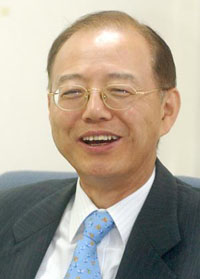As part of celebrating the 40th anniversary of KAIST, The KAIST Herald had a chance to interview our university’s longest-serving professor. Professor Dong-Wan Tcha of KAIST Business School was appointed as professor in 1975 and has witnessed several big changes in KAIST over the past 40 years. Professor Tcha shared some of the more vivid stories with The KAIST Herald.

Can you introduce yourself briefly?
I graduated from Seoul National University with a bachelor’s degree and received both master’s and doctor’s degrees in Industrial Engineering and Operations Research at Northwestern University. During this time, I began to take interest in the field of information technology, which became one of my major research areas. With my expertise, I contributed to the introduction of Operations Research and to the advancement of the IT industry in Korea. After moving to Seoul, I have been working as a professor at KAIST Business School, educating graduates who are leading the convergence of technology and management.
What motivated you to become a professor at KAIST?
When the Korea Advanced Institute of Science (KAIS) was established in 1971, both computer and management sciences were emerging fields that were intensively fostered as strategic industries. However, there were hardly any experts with a Ph.D. in management science in the 1970s. Thus, after receiving my doctorate in Operations Research at Northwestern University, I was recommended to work at KAIST. In 1975, I was appointed as a professor in the Department of Industrial and Systems Engineering, and I have been working at KAIST since then.
How did KAIST change over the past 40 years?
When President Chung Hee Park established the basis of KAIST back in the 1970s, no proper graduate education in science and engineering was offered in Korea. Thus, when KAIST was established with a large amount of government funding, outstanding faculties from the United States were selected to educate some of the brightest students in the nation. All faculty members were fully committed and provided a high level of education, and students worked really hard to become competitive at a world-class level. At that time, the quality of the master’s courses offered at KAIST was on a similar level with that of top state universities in the United States which was quite an accomplishment, considering the poor domestic environment.
Graduates of KAIST contributed greatly to the development of industries in Korea. One of the major factors that made KAIST’s distinguished education possible was its passionate working environment led by many professors. Working with a sense of duty, professors at KAIST worked hard to create a research-oriented environment which became KAIST’s biggest asset later on, and they served as role models for young professors.
In your opinion, what are the strengths and weaknesses of KAIST?
KAIST has many merits as one of Korea’s leading institutes of science and technology. For example, KAIST’s research-oriented environment not only produced numerous competent graduates, but also became the cradle of venture industries in Korea. Moreover, KAIST has successfully executed bold educational reforms based on flexible school management.
However, nowadays it seems like KAIST is losing its dynamics and boldness, often yielding to outside pressure. Additionally, due to various mergers in the past, KAIST’s organization has become too large. Naturally, faculties and students these days tend to have weaker bonds with the school and feel a fading sense of ownership and love for KAIST. Thus, in order to overcome these weaknesses, KAIST should be decentralized and thoroughly reorganized for optimal school management. Also, professors and students should give more affection and attention to KAIST. Having a sense of ownership is essential for an organization to succeed.
Do you have any last comments for students?
KAIST students are too stressed out and are under a lot of pressure from intense competition. But, if you think of it the other way round, it is natural to sometimes be behind your peers since you are competing with students who have similar academic abilities as you do. Besides, grades in one’s undergraduate years do not solely determine your future. Thus, there is no need to feel inferior just because your grades seem to be lower than others. In college, expanding perspectives and meeting various people who can give you worthy advice are much more valuable than simply earning high grade point averages on your transcript. Experience as many extracurricular activities as possible, join various clubs and build close relationships with your friends and professors. Also, don’t forget to spare some time to relax and look back at yourself from time to time.

